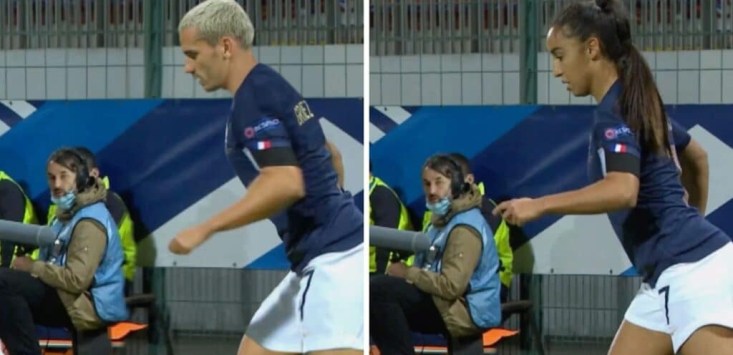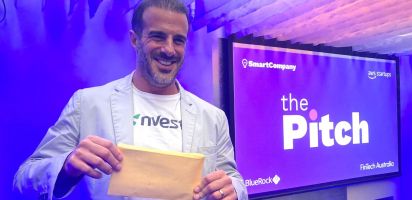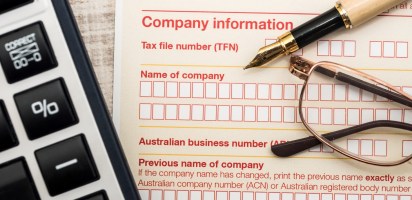
Screengrabs from the video
Some have labelled it one of the best advertisements they’ve ever seen, while others have lamented the need for such advertising in the first place.
Whichever way you slice it, an ad featuring the French women’s football team has got plenty of people talking ahead of the 2023 Fifa Women’s World Cup.
The ad was created by the agency Marcel for French telecommunications company Orange, which sponsors the national team, in June, but has recently garnered much more attention after doing the rounds on TikTok, Reddit and Twitter.
The two-minute-long clip begins with a montage of what appears to be the skillful play and goal-scoring of players from ‘les Bleus’, the French men’s football team, including Antoine Griezmann and Kylian Mbappé, set to dramatic music and commentary.
Get daily business news.
The latest stories, funding information, and expert advice. Free to sign up.
The text, “Only les Bleus can give us these emotions,” appears, referring to the nickname of the national men’s football team, followed by: “But that’s not them you’ve just seen”.
Then, the true identities of the players are revealed as the viewer learns the clip is actually a deepfake.
The players on the pitch are in fact members of the French women’s football team, including Sakina Karchaoui and Delphine Cascarino, and the faces of their male counterparts had been superimposed onto their bodies.
The ad ends with the words: “At Orange, when we support les Bleus, we support les Bleues,” referring also to the French women’s national team’s nickname.
Advertising industry stalwart Cindy Gallop tweeted a simple “WOW” when she saw the ad, while over on LinkedIn, Thirdweb and Flight Story founder Steven Bartlett gave the ad a 10 out of 10, in a post that has been liked almost 19,000 times and reposted more than 2,600 times.
“Every now and again, I come across an ad that I wish I had made,” he said, with many commentors agreeing.
— cindygallop.eth (@cindygallop) July 14, 2023
So is the ad effective, and why? SmartCompany asked a panel of advertising and PR experts to weigh in.
Jaimes Leggett, founding partner of Today the Brave
I think this campaign is genuinely brilliant.
It runs at the greatest challenge faced by the Women’s World Cup: that is, some inexperienced viewers perceive women’s football to be less exciting than men’s football – which many of us know not to be true. They’ve answered this problem head-on by showing viewers that women’s football is as exciting as men’s and clearly this has resonated with many.
You also have to acknowledge the amazing design and technology work used in this work as it is simply textbook and seamless.
My one constructive build to the work might be that – when watching the long-form edit, it does feel like it is perpetuating the problem if viewers don’t have the patience to wait for the reveal. The shorter form edits get to the point quicker and are stronger for it.
It really is a good idea, well executed. Which is not always the case.
Odette Barry, publicist, PR mentor, founder of Hack Your Own PR and co-founder of Launchpad Australia
This ad is a really clever play. Whether comparing men versus women in sport is the right path forward, and whether women’s sport needs to leverage men’s sporting profile to get attention, is almost superseded by the fact the ad has generated thousands of global media headlines well beyond the paid timeslots the advertiser invested in — and moreover, initiated important conversations about bias in sport. Whether you believe women deserve pay parity in sport, or not, this ad has talkability and has got tongues wagging, which I think has delivered on the brief.
The downsides? The ad itself is two-minutes long and while I’d hope that people watched the whole thing, I think there is a risk of selling the punchline too late. It’s not until halfway through that we get a sense of the purpose behind the message.
If the target audience for the ad is sports fans then the visual effects need work; as commentators have pointed out, the clips look not too dissimilar to my son’s Xbox version of FIFA, so perhaps if the goal was to convince viewers that ‘men and women’s sport is equally exciting’, it may not have landed. However, if the campaign goal is more broadly about brand awareness, and capturing the attention of people who aren’t typically interested in sports, to check out women’s games, then I think the level of energy and excitement, and the message will translate to bringing cold audiences closer.
A final thought: so many companies claim to champion diversity and inclusion but money talks. Is Orange providing the same sponsorship dollars to both teams?
Ben Birchall, director of brand voice at SouthSouthWest
This is a great piece of communication and while it’s a little heavy-handed, it tells an interesting story about women’s football in France. You don’t need to get a subscription to Le Monde or listen to Parisienne 3AW talkback (if it exists) to figure out what prevailing attitudes must be. It’s that rare piece of sports sponsorship that dares to have an opinion.
It also provides a telling contrast with the way brands interact with round ball football in Australia. The Matildas have been able to exist alongside the Socceroos, partly because the men’s version of the game isn’t as deeply embedded in our nation’s psyche. And it helps that the Matildas are really bloody good. Because in Australia, winning even trumps deep-seated gender bias. So the advertising and messaging around the Matildas can just be about the Matildas (and especially Sam Kerr) just being awesome.
So while we live in that utopia, Orange and its agency have recognised that France needs a little help to get where we already are with the round ball football, and arguably cricket. Now… could we get their agency to work their magic on the AFLW?
Mary Proulx, co-founder of Bread Agency
I should start by saying, I’m not really a football fan, yet I watched this intently from start to finish the first time it popped up in my feed.
The insight and idea are strong and the execution was flawless. A big round of applause for the design team that absolutely smashed it out of the park.
Ultimately, it makes you question your own biases and look at the game differently.
That said, I was left feeling like the women’s team was overshadowed and although it highlighted a real problem, they may have missed the opportunity to truly celebrate the women’s team and skill. Not sure les Bleues got the recognition and excitement that they deserve here.
My final point comes down to the distribution strategy. As someone who specialises in social media I was interested to see how Orange was leveraging this campaign across their platforms. Disappointingly, I couldn’t find any other touch points across their channels, which felt like a missed opportunity.
Cherie Clonan, CEO of The Digital Picnic
Our whole team was talking about the ad today; it was the first conversation we had this morning. We are a performance marketing agency and we love looking at different ads and those creative assets coming together.
It is a brilliant ad, but I think it’s got really problematic undertones for women. And sometimes, it’s quite amazing to see how you can be so wowed by the obvious things in that ad, like the tech, but not really realising you’re engaging with something that is problematic.
I couldn’t watch it as a woman and not see it as just an unnecessary comparison with the use of tech. I felt like surely in 2023, female sport can stand on its own without computer-generated sorts of comparisons between men’s and women’s football on this occasion.
And it’s a shame because it is honestly such an incredible ad.
If we wanted to do computer-generated comparisons, why couldn’t we generate what it looks like for that woman when she first wakes up? What does her life look like before she goes out and does what she does on the field? That would have been even more powerful and compelling, and not just for women, but for men too, just showing like the ‘before’ for the athlete, and then obviously the ‘after’ being when they’re on the field doing what they love what they get paid to do and so on.
You can do so many things without comparing us to men in an ad like that and it just puts everything back a million steps, and it’s not a place we want to be in 2023. I think, anyone working in adland, we’ve all got to collectively just do better and sort of be aware of this when ideas are being generated, and maybe when having these conversations, say: ‘Do you think this could be problematic content?’.
Jonathan Heath, creative director at Hardhat
The conditions were perfect for this ad, and it will probably never be done again with such impact. It’s also probably why there’s such an outpouring of love and professional jealousy. It follows a great tradition of women’s football tournament ads that poke us in awkward places and remind us of the gulf in investment in the attention and financial stakes. I’m reminded of a spot for the German women’s national team in 2019 that callously called out the fact that no one knew the players’ names. Harsh but true. And it still tracks.
We’re on the eve of the biggest Women’s World Cup to date. The standard is incredibly high, and the competition will be fierce, yet the sport is still mired in financial disparity and unfairness. It’s nice to see a global telecom do something this abrasive when they could have easily produced a vanilla sponsorship execution that forced a football star to stumble on some horribly trite line down the barrel of the lens before the logo lock-up.
There’s a touch of finger-wagging smugness about it, but the execution has enough panache thanks to some Black Mirror-esque technical wizardry that takes it above and beyond and makes it worth celebrating.
Jess Jones, women in sports advocate, former board of Frankston Footy Club and current partnerships manager
This is a brilliant example of the magnificence of women’s sport, whilst tapping into the unconscious bias that comes from generations of brainwashing around elite male athletes. How many viewers would have watched this footage and then be either surprised or even disappointed when learning the magic they’d just witnessed was in fact women athletes instead of the male footballers they believed they were watching?
At a grassroots and community sports level, I have witnessed women’s sport and women’s teams often overlooked for investment and funding because they ‘apparently’ don’t have the same level of skill or excitement that men’s sport attracts.
The challenge that women’s sport faces is that it needs funding and visibility. To get funding, athletes need visibility; to get visibility they need funding. So we have a chicken-egg situation where broadcasters, investors and major brands need to take a leap of faith to back women in sport. A classic example where women’s sport is treated without the respect it deserves is the global fight for broadcasting the FIFA Women’s cup has experienced where the majority of games are pay-to-watch, compared to the men’s World Cup where every game was broadcast free to air.
Showing prejudice through unequal broadcasting rights on a global level, sadly, has a trickle-down effect, sending a conflicting message at the community sport level that women’s sport is not good enough while locally we are championing a message that women in sport matter.
There are already enough challenges for women playing community sports, including run down and poorly maintained facilities, not even enough change rooms or grounds for women, and on and off the field, there are not enough women’s voices being heard, for example, leadership, coaches, and umpires.
The ad is a great starting point to amplify conversations about the importance of women’s sports and the often unintended gendered preferential treatment.
Handpicked for you

Nissan created a four-hour lofi YouTube ad and people actually love it




COMMENTS